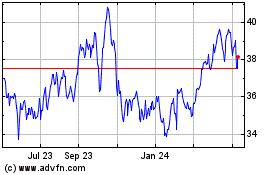Crude Slump Weighs On Oil Firms' Earnings -- WSJ
July 29 2016 - 3:03AM
Dow Jones News
By Selina Williams
LONDON -- After two years of spending cuts, canceled projects
and tens of thousands of layoffs, Europe's biggest energy companies
are still struggling to cope with a prolonged oil-price rout.
Royal Dutch Shell PLC Thursday reported a 93% drop in profit and
rocketing debt for its most recent quarter, sending shares down
sharply. Smaller peers such as France's Total SA and Spain's Repsol
SA also booked lower profits Thursday, while rivals BP PLC and
Statoil ASA announced similarly grim results earlier in the
week.
The sector's second quarter results show how difficult it is for
companies built to spend billions of dollars pumping $100-a-barrel
oil to adapt to a world where oil now sells for less than half
that. Since mid-2014, the oil price has dropped by some 60%.
"Lower oil prices do continue to be a significant challenge
across the business," Shell Chief Executive Ben Van Beurden said
Thursday on a conference call.
Shell's shares fell more than 4% after the Anglo-Dutch oil giant
reported declines across its business. Weaker oil prices, poor
refinery profits and high charges stemming from Shell's $54 billion
acquisition of BG Group PLC, which completed in February, all
dragged down results.
While the BG deal helped boost Shell's oil and natural-gas
production by nearly a third in the second quarter from a year
earlier, the prices it received for its products were a third
lower. Shell's profit on a current-cost-of supplies basis -- a
measure similar to the net income that U.S. oil companies report --
was $239 million, down from $3.36 billion a year earlier.
Mr. Van Beurden has staked his reputation on the BG deal, which
brought more access to liquefied natural gas and deep-water oil
projects. But the global LNG market is currently oversupplied and
Shell, which earlier this month deferred making a decision on
whether to build a major new LNG development in Canada, pulled back
from one in the U.S. on Thursday. The company said it would delay
deciding on whether to construct a giant new export plant in Lake
Charles, Louisiana, citing affordability amid low oil and gas
prices.
Shell's debt has also ballooned to worrying levels following the
BG acquisition, analysts said. Its net debt as of June 30 was $75.1
billion, compared with $25.96 billion in the same period a year
earlier. Gearing, a measure of a company's debt-to-equity, rose to
28.1% at the end of the second quarter, nearing Shell's stated
maximum level of 30%.
"It may go up before it comes down again," Shell's Chief
Financial Officer Simon Henry said, blaming lower oil prices.
Energy companies suffering from the oil-price drop from
$115-per-barrel in mid-2014 to around $27 in January appeared set
for relief last quarter, when oil prices moved up toward $50.
But even with the rally, oil companies still struggled in the
last quarter.
And now the recovery appears to have stalled, thanks to a
gasoline glut weighing on the refining sector and depressing the
demand for oil. Refining had until recently provided a cushion that
helped to offset weaker earnings from sales of crude and natural
gas.
Earlier this week, BP said profit margins at its refineries fell
to their lowest levels since 2010. It came as the British oil giant
reported its third straight quarterly loss. BP posted a $2.25
billion net loss for its latest quarter citing the oil price slump
and a hefty charge related to liabilities stemming from its 2010
Gulf of Mexico oil spill.
Even stripping out the one-off charges, BP's underlying earnings
of $720 million were lower than analysts had expected, sending
shares down.
France's Total said its profitability fell again in the second
quarter as revenue from its refineries and petrochemical plants
deteriorated. Total's second quarter net profit fell 30% to $2.09
billion compared with the same period a year ago. It said it
expects to cut costs by more than the $2.4 billion originally
targeted.
Statoil said Wednesday it would cut capital expenditure by 8% to
$12 billion this year compared with previous guidance, as the
Norwegian producer swung to a second-quarter net loss on the year
on weaker oil prices and refining margins.
Statoil's gearing rose to 31.2% at the end of the quarter
compared with 22.4% a year ago.
"We are comfortable with a debt ratio well above 30% because we
have a big toolbox," Statoil President and Chief Executive Officer
Eldar Sætre said, citing the company's flexibility on what to
invest in.
Repsol's second-quarter net profit was EUR205 million ($226.73)
compared with EUR292 million a year earlier as the company booked a
EUR346 million restructuring charge due to job cuts.
U.S. oil giants Exxon Mobil Corp and Chevron Corp and Italy's
Eni SpA are to publish results on Friday.
Kjetil Malkenes Hovland in Oslo, Inti Landauro in Paris and
Carlos Lopez Perea in Madrid contributed to this article
Write to Selina Williams at selina.williams@wsj.com
(END) Dow Jones Newswires
July 29, 2016 02:48 ET (06:48 GMT)
Copyright (c) 2016 Dow Jones & Company, Inc.
BP (NYSE:BP)
Historical Stock Chart
From Mar 2024 to Apr 2024

BP (NYSE:BP)
Historical Stock Chart
From Apr 2023 to Apr 2024
